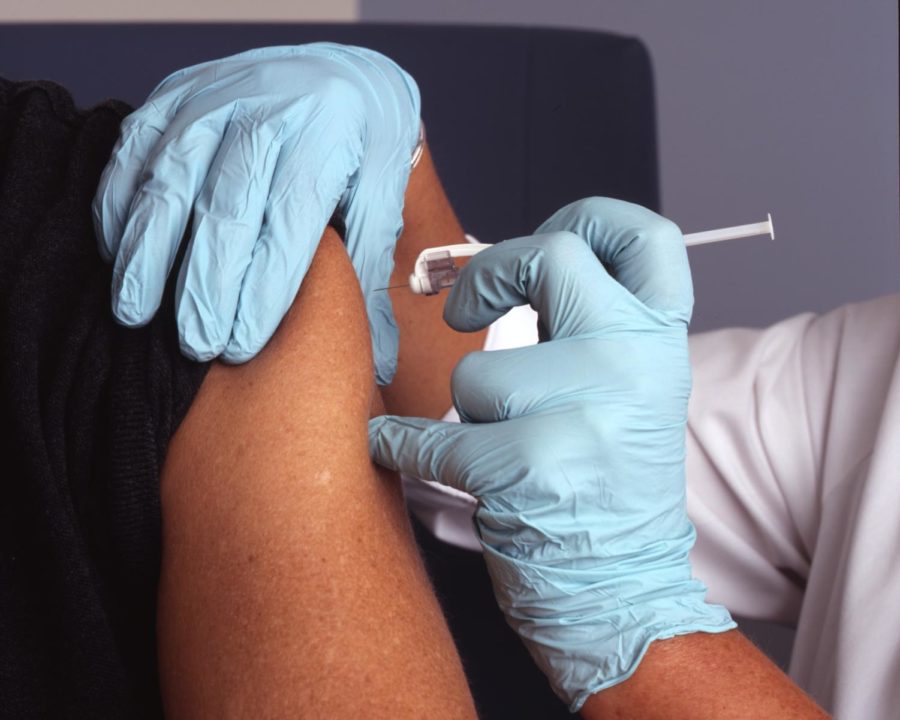Editorial: Should colleges require the COVID-19 vaccine?
May 23, 2021
More than 300 colleges and universities are requiring students to get vaccinated before returning to school in the fall.
In Iowa, Grinnell College is the only university to require students to receive the COVID-19 vaccine as of May 20. Iowa’s three public universities will not. At this point, they wouldn’t be allowed to, regardless of any further decision from university administrators.
The Iowa Board of Regents has decided not to mandate the COVID-19 vaccine, so these three universities cannot go against the Board’s decision.
The first problem here is that the Board of Regents is taking over a function that was essentially left up to each individual school the past year. Iowa State, the University of Iowa and the University of Northern Iowa all had their own COVID-19 prevention and mitigation measures, so why is this specific decision left up to the Board?
Iowa is not the only state where public universities are legally not allowed to require a vaccine. In some states, however, universities are required to mandate the vaccine, and still other states have rules that differ between private and public universities. All in all, the patchwork quilt of vaccine requirements at higher education institutions across the country is confusing at best and a potential health crisis at worst.
It’s not illegal for states to ban vaccine requirements, but that doesn’t mean it’s in the state’s best interest.
The American College Health Association (ACHA) recommended in April that all colleges require students and staff to receive the COVID-19 vaccine by the fall, provided the requirement adheres to state laws, is supported by adequate resources and allows exemptions.
“In addition to the obvious physical and mental health advantages offered by a highly vaccinated campus population, there are economic, academic and social advantages. The resumption of continuity in the academic, extracurricular and residential experience will, once again, enhance students’ personal, professional and academic growth,” the organization wrote in a statement.
The ACHA correctly pointed out that colleges and universities have had vaccination requirements for decades. According to a profile done in 2018-19, 68 percent of higher education institutions required vaccinations against measles, mumps and rubella (the MMR vaccine). Many also require vaccinations against other diseases.
Iowa State requires new and transfer students to provide proof of measles vaccination (with students able to apply for exemptions for a number of reasons), as do both the University of Iowa — which also strongly recommends a number of other vaccinations — and the University of Northern Iowa.
This last year alone, a large number of colleges began requiring flu vaccinations for students and staff.
An easier way to view the issue is by looking at it from the viewpoint of the military, which requires yearly flu vaccinations for all service members and is considering making the COVID-19 vaccine mandatory as well.
They do this not because service members are higher-risk or more likely to spread the virus, but because logically, vaccinating all service members will make them safer and help the military return to normal operations.
Similarly, vaccinating all students and staff on college campuses, which are notorious for high rates of infection and transmission, will help keep the college community safe and allow everyone to return to normal as soon as possible.
Maybe some of you weren’t concerned about safety during the COVID-19 pandemic, but many other students and faculty were. Making the vaccine mandatory will allow all students to get back to normal activities — large parties, packed classes and traditional campus events — without sacrificing the health and safety of the larger community as a whole.
Those who oppose vaccine requirements on college campuses raise some fair points, such as the concern over violations of personal rights and liberties. After all, if you don’t want the vaccine, why should you have to take it? Colleges can’t make you get a vaccine.
Of course, that’s not exactly true. Two Supreme Court cases from nearly a century ago, Jacobson v. Massachusetts and Zucht v. King, have determined that vaccine mandates are allowed under the Constitution. Additionally, colleges allow exemptions for medical concerns, religious objections or a number of other reasons.
None of us are entitled to a college education, and if you can’t agree to university requirements, you should find another university.
It is legal for colleges and universities to require vaccines and so much safer than the alternative. The merits of vaccines have long been proven.
Vaccines save lives.
Some of you will consider this editorial pointless because Iowa State can’t require a COVID-19 vaccine anyway, but we believe a discussion about this needs to be held. If you disagree with a COVID-19 vaccine mandate in Iowa, ask yourself why.
Is it just the COVID-19 vaccine? Are you also against the MMR vaccine requirement that nearly 70 percent of universities (including Iowa State) have? What about the flu shot? And if you really are that principled against vaccines — which is, of course, your right — then why are you here?
In any case, there is good news on the horizon. As of May 23, more than 1.3 million Iowans had become fully vaccinated, a number that will only increase throughout the summer.
Iowa’s COVID-19 14-day positivity rates are below 3 percent, and hospitalizations continue to slowly decrease.
Get vaccinated, stay safe and save lives. Like you, we’re looking forward to a return to normal this fall.







